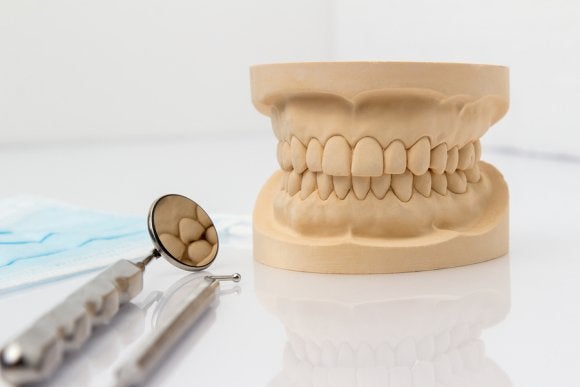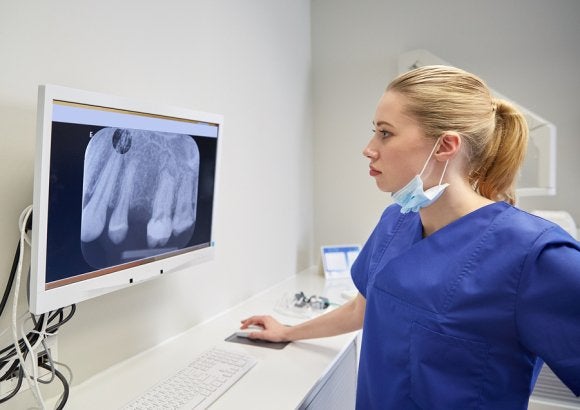-
Different Dental Restoration Procedures
A dentist in Bel Air, MD, has many techniques for restoring your smile . If you are missing teeth or suffer from tooth decay, ask your dentist about restorative dentistry.
With dental restoration, a dentist can help you achieve a healthier and better looking smile. If you have lost teeth due to accidents or tooth decay, your dentist may suggest dental implants to restore your smile. Dental implants are tiny titanium screws that fuse with the jawbone to provide permanent anchors for a dental bridge or crowns. A dental clinic should also regularly perform root canal procedures. With root canals, your dentist removes inner tooth pulp that has become infected. As long as the infection is caught early, a root canal can help preserve the natural tooth. However, your dentist may also use crowns to strengthen the tooth. Dentists also offer dentures and partial dentures for individuals who have lost all or most of their teeth due to age or periodontal disease. Finally, if you have cavities, dentists use composite fillings to repair the affected teeth. All of these techniques ensure that you can have a full and healthy smile.

-
What’s Causing Your Bad Breath?
If you have reported bad breath symptoms to your dentist in Bel Air, MD , you most likely have no cause for concern. However, it is important to practice good dental care habits, as bad breath may be caused by poor oral hygiene.
To ward off bad breath, dentists suggest brushing twice per day and flossing every night. In addition to regular teeth cleanings at your dental clinic, good dental care at home is essential to keeping your whole mouth healthy. However, bad breath also has more serious causes. For example, bad breath can be caused by a dental abscess, gum disease, or tooth decay. It is important to tell your dentist about bad breath.
-
Steps to Take in Preventing Gum Disease
Gum disease, also known as periodontal disease, is one of the leading causes of tooth loss in adults. Initially, periodontal disease in Bel Air can be difficult to detect until it has advanced. In the early stages of gum disease , usually referred to as gingivitis, most people may not notice any signs at all. This is why it is so important to regularly visit a dentist to monitor signs of gum disease. Luckily, gum disease is easy to prevent. Since it is caused by bacteria, it is simply a
 matter of reducing the amount of bacteria in your mouth. Keep reading for tips on gum disease prevention.
matter of reducing the amount of bacteria in your mouth. Keep reading for tips on gum disease prevention. Routinely Brush and Floss
A dental hygiene routine is key to preventing gum disease. At a minimum, you should brush your teeth twice a day and floss teeth once a day. For the best results, brush and floss after each meal. This will help eliminate food particles that can get stuck in between teeth and cause bacteria to grow. It is important to use a toothbrush with different lengths of bristles to ensure that all surface area of each tooth is reached. Using toothpaste with fluoride helps protect your mouth from gum disease. When flossing, be sure to get in between each tooth, especially the back molars. In addition to brushing and flossing, a mouthwash can help rinse away pieces of food and also freshen your breath.Regularly Visit the Dentist
No oral health care routine is complete without annual visits to the dentist. Most dentists recommend regular visits every six months. During a dental exam, a dental hygienist will perform a teeth cleaning that is able to remove plaque and tartar that you cannot clean off at home. Once plaque hardens, it forms tartar, which can lead to gum disease. Regular dental cleanings help prevent tartar buildup. A dentist will likely take x-rays to detect any abnormalities in your mouth. By regularly visiting your dentist, you can also notify them of any new pain or other problems. Early detection of problems can prevent major problems down the road and also help you avoid the need to see an emergency dentist. -
What Is Your Sensitivity Saying About Your Teeth? [INFOGRAPHIC]
Do hot, cold, and sweet foods send an unwelcome jolt through your mouth? If so, you could be suffering from sensitive teeth. Tooth sensitivity occurs when the gums retract, exposing the dentin, which provides a straight path to the nerves in your teeth. Extreme temperatures and high-sugar foods trigger those nerves and cause a searing, painful sensation. Tooth sensitivity isn’t a dental health problem in itself but is rather a symptom that should be evaluated by your dentist if it persists. While some cases of sensitivity are easily addressed by changing toothbrushes, other cases are associated with decay and disease that should be treated by your dentist. Learn more about tooth sensitivity in this infographic from Your Smile . Our dentist in Bel Air, MD provides comprehensive oral health care, including dental implants, cosmetic dentistry, and tooth extraction. Contact us to set up an appointment, and please share this information with your friends and family.

-
Oral Health During Pregnancy
If you are pregnant or plan on becoming pregnant soon, you can expect many changes in your life. In addition to making room in your home for your new family member, you’ll be making many appointments to make sure your health is in good order. This includes calling your dentist in Bel Air, as pregnancy can cause changes in your oral health. Watch this video to learn more about how your dentist can help you maintain good oral health during pregnancy .
As your dentist can tell you, pregnant women may notice that their gums are more sensitive or bleed more easily during the first few months of pregnancy. This is known as pregnancy gingivitis, and is a relatively common occurrence. You should brush your teeth twice per day and floss every day, taking care to use a fluoride toothpaste and a toothbrush with soft bristles, to prevent gingivitis and gum disease. Your diet is important during pregnancy both for you and your growing baby. Go for a variety of fruits, vegetables, and dairy products, and try to minimize your sugar intake to keep your mouth and body healthy.
-
Risk Factors for Gum Disease
Everyone wants to have a beautiful smile full of healthy, white teeth. However, there’s more to oral health than just having a bright smile. In addition to visiting your dentist near Bel Air every six months, you should brush your teeth twice per day and floss on a daily basis. This combination of professional and at-home oral care will help keep tooth decay and gum disease at bay. Gum disease can be painful and damaging to your oral health, as it could lead to tooth loss if it is left to progress unchecked. Keep reading to learn about the risk factors for gum disease and what you can do lower your risk.
Age
While there are some risk factors for gum disease that you and your dentist can control, there are others that you just can’t. As you grow older, you are at a greater risk for gum disease. According to the Centers for Disease Control and Prevention, over 75 percent of people in the U.S. ages 65 and older have gum disease. Make sure that you are visiting your periodontist regularly if you have a history of or signs of gum disease.
visiting your periodontist regularly if you have a history of or signs of gum disease. Smoking
It is widely known that smoking and using other forms of tobacco is dangerous for your health, and your oral health is no exception. Smoking greatly increases your risk of periodontal disease, and using tobacco can exacerbate any gum disease that is already present. Additionally, if you continue to smoke, it will be much more difficult to treat gum disease in a successful manner.Genetics
If you have a family history of gum disease, you may be at a greater risk of developing it yourself. That’s why it’s important to discuss your medical history with your dentist, as a preventive treatment plan can help lower your risk of gum disease.Stress
Stress can take a physical toll on your body as well as mental and emotional tolls. Studies have shown that high levels of stress make it harder for your body to fight off infections, which can include periodontal disease. Work on reducing your stress levels to improve your oral health as well as your overall outlook. -
Screening for Oral Cancer
Did you know that approximately 42,000 new cases of head and neck cancer are diagnosed each year? 65% of these begin in the oral cavity, which is why dentists in Bel Air recommend regular screening for oral cancer.
Regular visits to the dentist are essential for early oral cancer detection. During your bi-annual check-up, your dentist will conduct a preliminary screening to look for any abnormalities. About 10% of patients have a flat, painless white or red spot or a small sore on the inside of the mouth. Testing can determine if this spot is harmless or cancerous. Your dentist may take tissue for checking or send you to a specialist. Because many of these spots and tooth abscesses may be visible only to your dentist, it is vital to visit your dentist’s office, especially as you get older.
-
When Is a Root Canal Necessary?
There are a number of reasons you may need a root canal near Bel Air . A root canal is a procedure performed by a dentist to remove the tooth nerve. The procedure is done to save a tooth that has become infected or shows signs of bad decay. It may not always be immediately apparent when a root canal is necessary. This article will highlight some of the more common reasons a root canal would be required.
When Tooth Pain is Present
Not all tooth pain is a reason to have a root canal, but pain is a major indicator that something is wrong. If the pain is present when eating or when pressure is applied, it could be indicative of nerve damage. Extra sensitivity or pain to hot and cold is also a sign of nerve damage. If a tooth that is infected or badly decayed causes the pain, a root canal will need to be performed to stop the pain.
present when eating or when pressure is applied, it could be indicative of nerve damage. Extra sensitivity or pain to hot and cold is also a sign of nerve damage. If a tooth that is infected or badly decayed causes the pain, a root canal will need to be performed to stop the pain. If a Tooth has Become Abscessed
If a tooth that is infected is left untreated, an abscess will form. An abscess is a pocket of puss that forms in the tooth. An abscessed tooth can spread to other teeth and gums, furthering the infection. While it may or may not cause pain, an abscessed tooth is usually visually noticeable. The puss pocket that forms has an appearance similar to that of a pimple. Some patients with an abscessed tooth may even notice puss oozing from the affected area. A root canal is necessary to repair the abscessed tooth.When a Tooth has Been Damaged
Any time a tooth is damaged and the nerve is affected, a dentist will likely perform a root canal. In the event of trauma to the tooth, such as being hit in the face with enough force to damage a tooth, the nerve can be severed. If this happens, a root canal can be performed to fix the nerve. -
What’s in Your Toothpaste?
Do you know what you can do to prevent gum disease in Bel Air ? Visit your dentist regularly and brush your teeth twice a day. One of the best ways to prevent gum disease and other dental problems is to practice good oral hygiene that includes brushing and flossing. While it is no surprise that brushing your teeth helps prevent gum disease, you may not know what is in your toothpaste that is so important.
The most important ingredient is fluoride, a mineral that helps fight bacteria in your mouth that leads to gum disease. Watch this video for more information about all the ingredients in your toothpaste. From potassium nitrate to help protect sensitive teeth to pyrophosphates to fight tartar, toothpaste is full of active ingredients to keep your teeth healthy. Your dentist can help you learn more about toothpaste.
-
Technology Spotlight: Digital X-Rays
Along with regular teeth cleanings and inspections for oral cancer, digital x-rays are a common procedure in general dentistry . Instead of x-ray film, many dentists near Bel Air now rely on images captured from an electronic sensor and stored on a computer. This innovative technique reduces radiation by up to 90%. X-rays are essential diagnostic tools because they reveal problems that cannot be seen with the naked eye. For example, x-rays taken by your dentist may reveal tumors, tooth decay, abscesses or cysts, bone loss, or gum disease. By detecting and treating dental issues at an early age, your dentist can help save you time, money, and pain down the road. While x-rays are completely safe, dentists still use shields to protect the body and only take x-rays that are absolutely necessary. Your dentist will generally recommend x-rays after undertaking a careful review of your medical and dental history, considering your signs and symptoms, and taking into account your age and risk of disease.

RECENT POSTS
categories
- Uncategorized
- General Dentistry
- Toothache
- Emergency Dentistry
- Family Dentistry
- Receding Gums
- Cosmetic Dentistry
- Veneers
- Gum Disease
- Gingivitis
- Dental Crowns
- Orthodontics
- Dental Implants
- Root Canal
- Wisdom Teeth
- Teeth Whitening
- Your Smile
- Composite Fillings
- Lumineers
- Dentures
- Invisalign
- BrightSmile
- Dental Bridge
- Abscessed Tooth
- Sealants
